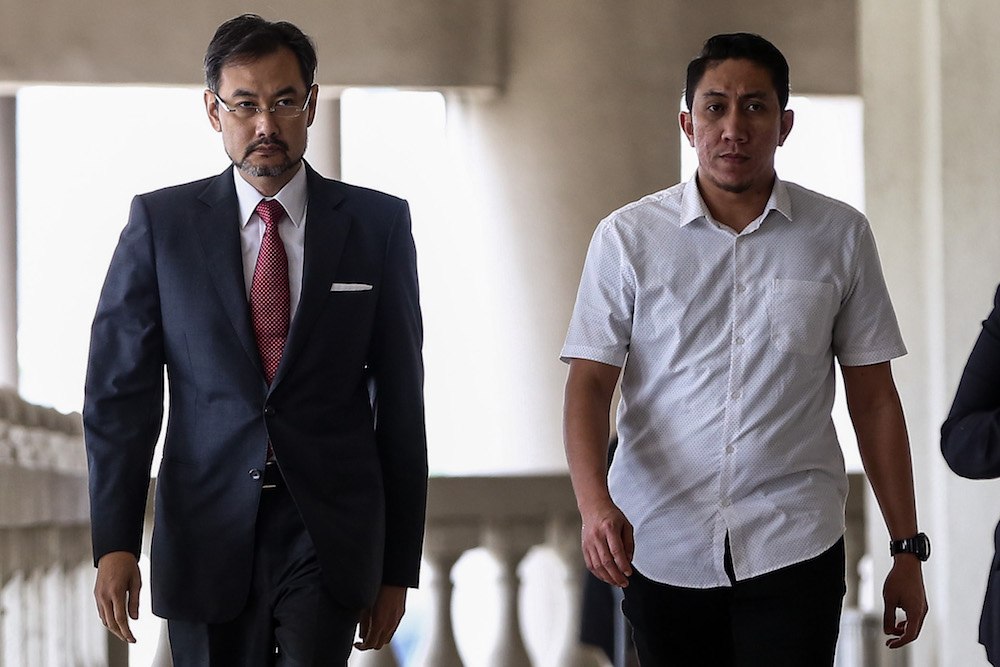KUALA LUMPUR, Nov 4 — 1Malaysia Development Berhad (1MDB) did not try to hide from Datuk Seri Najib Razak the fact that it had received no returns from its US$1 billion (RM4.1 billion) “investment” in a joint venture with its purported business partner PetroSaudi International Limited (PSI), the High Court heard today.
1MDB former CEO Datuk Shahrol Azral Ibrahim Halmi denied that a new deal in 2010 was meant to prevent Najib from discovering the 1MDB’s then auditor Ernst & Young’s concerns about the status of the US$1 billion.
Back in 2010, Ernst & Young was pressing 1MDB for information on what had happened to the US$1 billion, before it would agree to signing off on the annual audit report for 1MDB, the court heard.
Shahrol, however, confirmed that 1MDB did not have the necessary information on the status of the US$1 billion in the initial September 2009 joint venture deal, as its purported partner PSI had refused to provide the information.
“The challenge was by March 2010, 1MDB needed to have enough information about the joint venture company in order for the auditors to be satisfied that the value in the joint venture company is as per stated.
“That was a big challenge. We were unable to get enough information from the PetroSaudi side to relay to auditors, pertaining not only to value of assets but also the operations of the joint venture company,” Shahrol said.
Shahrol explained the difficulties faced by 1MDB as it pursued information from PSI officials, adding that an attempt by 1MDB executive director Casey Tang to personally meet the two PSI officials were not fruitful.
“We were trying to get information from Patrick Mahony and Tarek Obaid but there was none forthcoming. I also tried going through Jho to get information on that. I also asked Casey to fly over and meet Patrick and Tarek to find out what were the plans for the money that we were investing,” he said, confirming that there were no satisfactory answers given.
Shahrol later also confirmed that the joint venture company did not carry out any board meetings since September 2009 to the end of March 2010, and that 1MDB as the shareholder of the joint venture company was denied access to the financial accounts and not given any audited financial statement.
With Ernst & Young refusing to sign on 1MDB’s annual audit report until the audit firm had information on the status of the US$1 billion that was placed in the joint venture, Shahrol confirmed that the new deal would have solved the problem.
Under the new deal, 1MDB agreed to convert its 40 per cent stake in the joint venture company 1MDB PetroSaudi Limited that it had bought at US$1 billion, into an Islamic loan to the same joint venture company.
The new deal saw 1MDB agreeing to sell off the 40 per cent share to the joint venture company, by giving on paper the Islamic loan via Murabahah notes to the joint venture company at a value of US$1.2 billion.
With the conversion to the Murabahah notes, the joint venture company would on paper owe US$1.2 billion to 1MDB, and effectively giving 1MDB a paper profit of US$200 million after accounting for the initial US$1 billion.
Shahrol agreed that the new deal would have satisfied Ernst & Young, as it would no longer query about the initial US$1 billion that 1MDB paid out in two batches of US$700 million and US$300 million.
The US$300 million was channelled to the joint venture company while the US$700 million was paid to Good Star Limited that Shahrol did not know then was owned by Najib’s purported adviser Low Taek Jho.
Shafee: So Ernst & Young would not query any more about the US$700 million and neither will they query any more about US$300 million.
Shahrol: Correct.
When asked if it was good for 1MDB that its auditors were given documents on the new deal that would not require them to find out what had happened to the initial US$1 billion, Shahrol said: “It was neither good or bad, it was just a way for us to preserve the relationship between 1MDB and PSI.”

Shahrol pointed out that he understood the relationship between 1MDB and the alleged Saudi-linked PSI to be “important” to both Najib and the country, as it was painted to him as a strategic relationship linked to the ties between Malaysia and Saudi Arabia.
Shahrol confirmed that he knew that Ernst & Young initially did not want to sign the auditor’s report on 1MDB as financial reporting standards were not met then, but said this was only told verbally and not in writing to Najib.
At that time, Najib was the prime minister and also 1MDB’s sole shareholder in his capacity as finance minister via Minister of Finance Incorporated, and was also 1MDB board of advisers’ chairman.
Agreeing that it was important to tell Najib as 1MDB shareholder about Ernst & Young’s concerns, Shahrol said he had asked Low to inform Najib about the issue.
When asked why 1MDB did not officially inform the board of advisers which Najib chaired, Shahrol said: “Well, at that time we already knew that the problem was known to Datuk Seri Najib, at least that’s what Jho told me.”
“So we were looking for a solution that would satisfy what we believe the shareholder Datuk Seri Najib wanted, and also allowing 1MDB to move forward with closing its books for the financial year,” Shahrol added.
The prosecution has said that money that flowed from 1MDB on PSI’s instructions eventually made its way to various entities, including Najib’s purported adviser Low Taek Jho’s company and Najib himself.
Najib’s trial resumes before High Court judge Collin Lawrence Sequerah tomorrow morning.




















